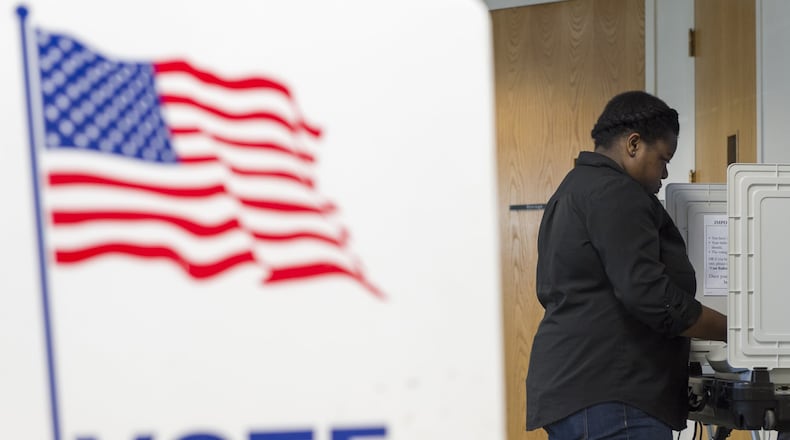Georgia plans to provide publicly-available voter information to President Donald Trump's commission on election integrity, but it will not share information considered private under state law such as registered voters' driver's license numbers, Social Security numbers and voting history.
The decision, which has been met with concern from civil rights groups, comes as the commission sent letters this week to states requesting their voter-roll data, including name, address, date of birth, party affiliation, last four Social Security number digits and voting history.
Officials from some states including California, Kentucky and Virginia have already announced their intentions to refuse the request, citing concerns over how the information would be used.
Others states like Connecticut have said they would share publicly-available information but nothing more. North Carolina Gov. Roy Cooper also said he recommended sharing nothing beyond what is public record. Tennessee officials said state law did not allow them to release the voter information requested by the federal commission.
In Georgia, officials with the Secretary of State’s Office said they would provide the same voter data made available to members of the public who request it — something it usually provides via an encrypted data disc for a fee of $250. It includes voter names, addresses, race if provided by the voter and gender.
The data shows whether a voter is considered “active” or “inactive” — inactive voters have not cast a ballot within the previous two general election cycles, an event that usually triggers an effort to determine whether the voter has moved, died or should otherwise be removed from the rolls.
It does not show party affiliation because voters in Georgia are not required to declare one. However, it does show whether voters requested party-specific ballots during primary elections.
It also shows a voter’s year of birth, but not month and day. Month and day of birth, along with driver’s license number, social security number, phone number and email address are specifically excluded from Georgia’s public voter list by law.
State officials said that information would remain protected and will not be provided to the commission.
But civil rights advocates raised alarms over the federal group’s request. Vanita Gupta, formerly of President Barack Obama’s U.S. Department of Justice and now head of the liberal Leadership Conference on Civil and Human Rights, said on Twitter she worried it could lead to “unwarranted voter purges.”
Trump formed the commission in May to investigate alleged acts of voter fraud after he made unsubstantiated claims of "millions" of illegal votes during last year's presidential election, including by undocumented immigrants.
Election experts across the country have said there is no evidence of any widespread voter fraud.
Officials from the Georgia Secretary of State's Office have repeatedly said there were no illegal votes in Georgia. They declined further comment Friday on the commission's request.
Georgia lawmakers in 2005 passed one of the nation's first voter ID laws, requiring people to show photo identification at their polling location. State officials — who won court approval to implement the law in 2007 —have called it a key component to preventing fraud at the polls, and it is strongly supported by the state's conservative GOP leadership, including Georgia Secretary of State Brian Kemp, whose office runs elections.
Several Georgia advocates questioned why Kemp would cooperate with the federal commission since he has decried federal intrusion into the state’s elections in the past, such as when former Homeland Security Secretary Jeh Johnson decided earlier this year to designate U.S. election systems as critical infrastructure.
“Rather than wasting precious taxpayer dollars on this witch hunt, the Georgia Secretary of State should focus his efforts on making sure that more people are able to participate in our democracy, not fewer,” said Sean J. Young, the ACLU of Georgia’s legal director.
Young called the commission a “sham,” adding that it continued “a sad, 150-year history of non-stop attempts to make it harder for racial minorities to exercise their fundamental right to vote, ever since the passage of the 15th Amendment after the Civil War.”
About the Author
Keep Reading
The Latest
Featured




